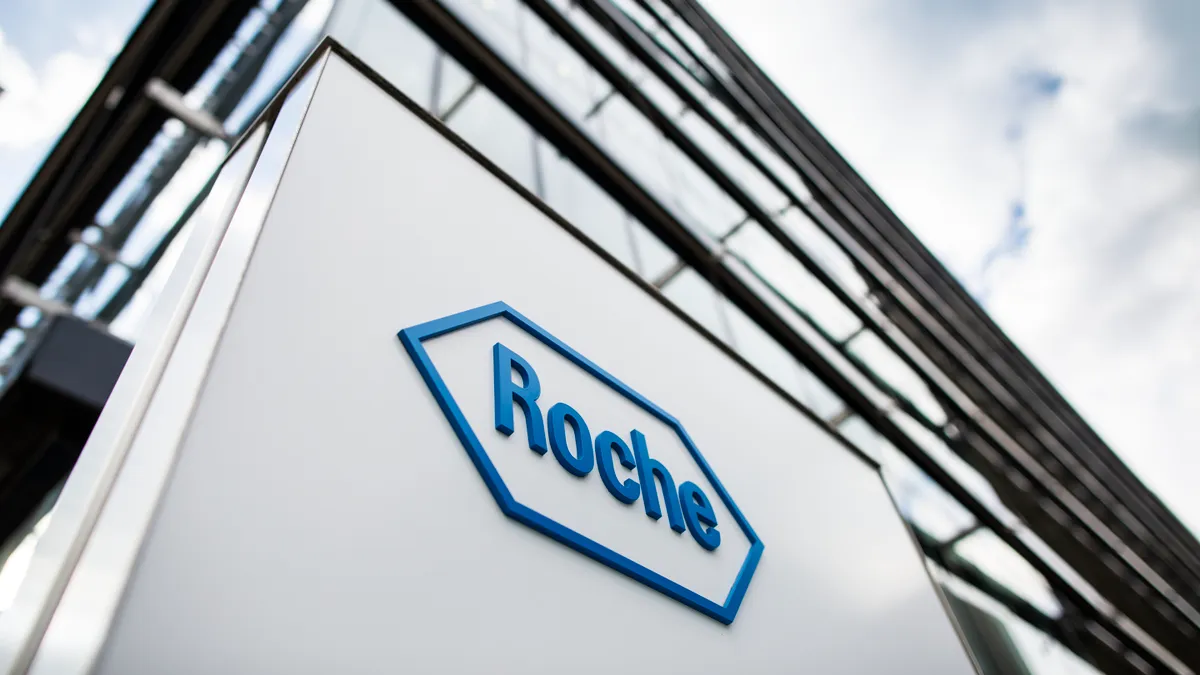Dive Brief:
- Roche on Friday announced it received FDA's emergency use authorization (EUA) for a swab sample test for the novel coronavirus. The Swiss pharma and diagnostics company expects to make "millions of tests a month" available in response to the pandemic.
- The product, which runs on Roche's cobas 6800/8800 high-throughput molecular testing systems, can deliver results in three and a half hours, the company said. In total, there are currently 827 of the systems distributed worldwide, over a hundred of which are in the U.S. A Roche spokesperson said the company has collaborated with CDC and is targeting its "limited supply" to large, national reference labs, along with some regional hospitals "in the most highly impacted areas." The company will "continually assess this strategy as the situation develops," the spokesperson said.
- Roche is the first commercial test developer to achieve EUA status for a diagnostic test for SARS-CoV-2. In an update Friday, FDA Center for Devices and Radiological Health Director Jeff Shuren said more than 60 developers have worked with the agency on potential EUA submissions, and more than 30 labs have said they plan to begin testing under a recent FDA coronavirus policy allowing use of pre-EUA lab developed tests.
Dive Insight:
FDA said it cleared Roche's EUA submission within 24 hours of receipt, after allowing Roche to pre-position the test in the U.S. That means labs should be able to immediately begin testing.
"Roche is committed to delivering as many tests as possible and is going to the limits of our production capacity," the company said in its announcement.
The test is also CE-marked. As far as capacity per day: Roche said each cobas 6800 system, 695 of which are distributed worldwide, can pump out 1,440 results. Each cobas 8800 system, 132 of which are placed globally, could produce 4,128 results.
Roche, which in January claimed to be distributing the first commercial test in China, was among the early players to work with FDA when the agency made pre-EUA materials available in anticipation of a Department of Health and Human Services declaration of a public health emergency. That came Jan. 31, and in the month and a half since, FDA has given EUAs to just two other tests: one from the Centers for Disease Control and Prevention (Feb. 4), the other from the New York State Department of Health (Feb. 29).
Since opening the EUA pathway, FDA has taken a more urgent approach to getting tests to market. The agency issued new policy two weeks ago that allows the use of lab developed tests prior to receiving emergency use authorization. Labs are required to submit an EUA request within 15 business days of validating a new test.
The agency's shift was followed by LabCorp and Quest Diagnostics launching tests last Friday and this past Monday, respectively. Neither have yet received EUAs, according to FDA's records.
LabCorp said last week its result turnaround time is about three to four days; the company can currently test about 3,000 U.S. patients per day. Quest's current capacity is a bit lower at 2,000 patients per day, according to estimates Thursday evening compiled by American Enterprise Institute.
In managing its response to the global health crisis, Roche Diagnostics is under the relatively new leadership of CEO Thomas Schinecker, who took up the role in July after a long career at Roche. The pharma previously obtained EUAs in response to the Zika and Ebola virus outbreaks.
In addition to the Roche news, FDA on Friday announced a new move to hand enforcement discretion to the New York State Department of Health (NYSDOH) in authorizing labs to begin testing, meaning certain test developers will sidestep FDA's EUA path entirely and instead provide validation to state authorities within 15 days.
After Washington state, New York is leading the U.S. in number of confirmed COVID-19 cases, counting more than 200 as of Thursday. FDA said it made its decision based on New York's "long-established framework in place for oversight of laboratory developed tests," and noted its previously accredited NYSDOH's research center and public health lab as a third-party reviewer for certain molecular tests.












